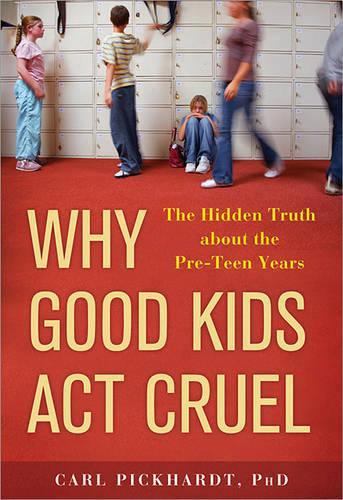
Why Good Kids Act Cruel: The Hidden Truth about the Pre-Teen Years
(Paperback)
Publishing Details
Why Good Kids Act Cruel: The Hidden Truth about the Pre-Teen Years
By (Author) Carl Pickhardt
Sourcebooks, Inc
Sourcebooks, Inc
1st January 2010
United States
Classifications
General
Non Fiction
Child, developmental and lifespan psychology
155.4248
Physical Properties
Paperback
320
Width 163mm, Height 194mm
345g
Description
Why do many good children treat one another so badly
This is a question parents eventually face and most start thinking about as their children prepare for high school. But the hard truth is, high school is too late. The pre-teen years are actually when it begins, when the cruelty is even worse, causing more anxiety and stress for children already facing an enormous amount of change in their lives. Early adolescence is a phase of anxiety, of uncertainty, of insecurity. To make matters worse, although all kids are going through the same transformation, none of them share what it is like, each feeling alone, isolated, and unique. The result is that even fantastic kids will do and say harmful things. Why Good Kids Act Cruel is the first book to give you an understanding of why cruelty happens during these years and how to help your child through these difficult times.
She didn't make it; she was born with it: her nose. And in elementary school that was okay. But now in seventh grade, sometimes other girls would tease, "What's the matter Blaise, you having a bad nose day" Looking in the mirror before school, she could see what they were making fun of. One day, a girl she had beaten out for a starting spot on the basketball team threw a nickname at her: "Snout." Some of the girl's friends picked it up, and it stuck. Blaise acted like she didn't care. But as she started to hate her nose, she started to hate herself.
Reviews
Why Good Kids Act Cruel is an excellent resource for adults seeking to help children get through adolescence and become healthy, socially responsible adults. -- ForeWord
Pickhardt accurately and compassionately captures the voice and concerns of children and parents alike. This should find shelf space with Rosalind Wiseman's Queen Bees and Wannabes and Giannetti and Sagarese's Cliques. -- Publishers Weekly
Pickhardt analyzes the psychology of the behavior, ending each chapter with advice on what parents and educators can do. Heavy on the victim end, light on the perp, this is an honest and valuable book for parents. -- Library Journal
Author Bio
Carl Pickhardt, PhD, is a published author and psychologist in a private counseling practice. Dr. Pickhardt, whose books include The Connected Father, The Future of Your Only Child and Stop The Screaming, is married with four grown children and one grandchild. He lives in Austin, TX.
